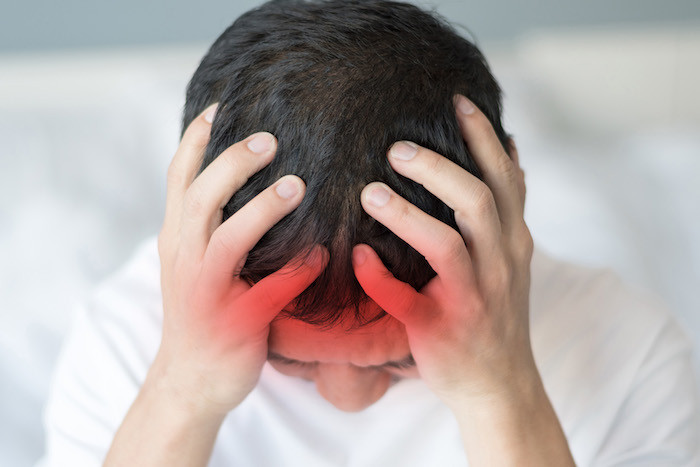
Headaches And Orofacial Pain
Chronic headaches can vary in severity and can be very debilitating to live with. Orofacial pain refers to pain that is felt in the face, mouth, or jaw area.
Migraine
There are a few types of migraines that can vary in severity. Migraines are common and, for some people, can be experienced frequently throughout the day or week.
Symptoms of migraines include:
- A throbbing or dull pain which is often on one side of the head
- Nausea and sickness
- Dizziness
- Sensitivity to light and sound
- Aura: flashing lights that can be seen before or during a migraine
Cluster headache
Cluster headaches are quite rare. They are extremely severe, intense headaches with pain typically felt in one side of the head and often around the eye, face, and temple.
Symptoms of cluster headaches include:
- Extremely intense pain
- Nausea and sometimes sickness
- Red, irritated, and watering eyes
- Drooping or swelling of the eyelid on one side of the face
- Blocked or runny nostrils
- Excess sweating, particularly around the face
- Restlessness and agitation
Visceral Pain
Visceral pain refers to pain that stems from your viscera: your internal organs. Visceral pain can cause inflammation, a range of pain symptoms, and a variety of other symptoms depending directly on the organ affected.
Irritable Bowel Syndrome (Ibs)
IBS is one of the most common visceral pain conditions. IBS affects the digestive system. The symptoms of IBS can come and go throughout the day or can flare up in reaction to certain foods and drinks.
Symptoms of IBS include:
- Pain or cramping in the stomach
- Bloating
- Diarrhea
- Constipation
Endometriosis
Endometriosis causes the lining of the womb to grow in other areas of the body where it wouldn’t normally be. This can include the ovaries, fallopian tubes, pelvis, bowel, bladder, intestines, and more.
Symptoms of endometriosis include:
- Pelvic pain (which worsens when you’re on your period)
- Severe period pain
- Pain when you go to the toilet during your period
- Pain during or after sex
- Problems getting pregnant
How To Reframe The Experience Of Living With Chronic Pain
How we perceive our pain can have a significant impact on our pain levels and the experience of living with pain. Although living with chronic pain is undeniably challenging, there are ways that we can reframe our thoughts about pain to perceive it more positively, just like many of these chronic pain warriors have shared with us.
Know That Chronic Pain Doesn’t Equal Damage
The sensation of chronic pain in itself doesn’t mean that there’s damage in your body. Chronic pain is like a faulty alarm system, sending out pain messages even when they don’t serve a purpose. Sometimes remembering that in itself, the pain isn’t going to ‘hurt’ you can help to alleviate fears and help you to cope with the pain.
Think Of Yourself As A Warrior
Instead of thoughts of helplessness and lack of control, focus on the fact that you’ve kept going despite it all! Imagining yourself as a warrior who is battling your chronic pain and is determined to win can help you to feel empowered. Even though it’s hard, you’re still fighting, and you are not going to give up!
Find Purpose And Joy
Searching for moments of joy in your life can be a powerful way to help yourself cope and to keep yourself going. Finding purpose, such as work or a hobby you are passionate about, can be a great way to keep you motivated.
Focus On The Good
Instead of focusing on the negatives of chronic pain, try to replace these thoughts with a more positive outlook. For example, if you think, “This pain is horrible, and it’s destroying my life,” instead, you could replace this thought with, “Although this is horrible, I’m still fighting and look at all the good things I do have in my life!”. Focusing on the good you have in your life despite the chronic pain can keep your spirit up and help you to maintain hope.
Don’t Be Afraid To Express Negative Feelings
Even though it’s important to try to focus on good things, this doesn’t mean you aren’t allowed to express how you feel! Nobody can be positive all the time, so know that reframing your thoughts doesn’t mean you have to bottle up your feelings. Chronic pain is hard, to say the least. You’re allowed to acknowledge that.
Know Chronic Pain Doesn’t Define You
Chronic pain does not change who you are. It doesn’t make you any less worthy, beautiful, strong, or any less you. You are still the same person you always were. When you find yourself thinking that chronic pain has changed your life, remember that.
Don’t Be Embarrassed About Your Symptoms
As one of our outstanding contributors Samantha, shared, it’s important to know that your symptoms are nothing to be embarrassed about. What is happening in your body is natural, even though it’s awful: it’s not your fault!
Find Ways To Set Goals
Although it’s easy to feel that you can’t reach your goals or plan for the future because of your chronic illness, try to work on reframing these negative thoughts. You can set goals, and you can reach them! It may take longer, you may need a little help, and perhaps the future may look different than you had imagined, but it doesn’t mean you can’t get where you want to go.
Seeing Challenges As Opportunities
When we face problems, instead of seeing these challenges as negative, we can look at them as an opportunity to learn and be creative. It’s useful to remember that you’ve found a way to deal with every challenge you’ve faced so far: you will continue to do so.
Finding Support
As 3 of our pain warriors, Steph, Jayne, and Katy, mentioned, finding support is so important and can help us to reframe our experience of chronic pain in a more positive light. Whether it’s friends (online or in person), family, support groups, or chronic pain charities, real support is invaluable.
Don’t Give Up!
As Andy and Katy shared, no matter what, don’t give up on your fight against chronic pain. Even when times are hard, believe in yourself and know that you are not going to let it win.
Be Kind To Yourself
It’s all too easy to be hard on yourself when you live with chronic pain, but instead of being harsh with ourselves, we can learn to be kinder and more compassionate, as we would towards others. As Zoe and Norita shared, practicing self-care is vital.
Know You Are Capable
Chronic pain can make us feel that we are not capable of so many things. Now is the time to replace these thoughts gradually with encouraging thoughts and actions. Know that you are capable! You can thrive despite your chronic pain.
Focus On What You Can Do Rather Than What You Can’t
Focusing on what we aren’t able to do because of our chronic pain can frankly be depressing. Instead, try to focus on what you can do, and you might realize just how much you are still able to enjoy your life and live well despite chronic pain.
Know Your Activity Level Does Not Define Your Worth
It’s vital to remember that even if you are not able to be active, this does not make you worthless! Your activity level and how healthy you are does not define how worthy you are! You are amazing; don’t let your mind tell you any different.
There Is Hope
Finally, but perhaps most importantly, remember that there is always hope. There are effective treatments and pain management techniques to help you to reduce your symptoms and to help you live the life you want to! Life can still be beautiful despite chronic pain.
Precision Pain Care and Rehabilitation has two convenient locations in Richmond Hill – Queens, and New Hyde Park – Long Island. Call the Queens office at (718) 215-1888 or (516) 419-4480 for the Long Island office to arrange an appointment with our Interventional Pain Management Specialist, Dr. Jeffrey Chacko.













